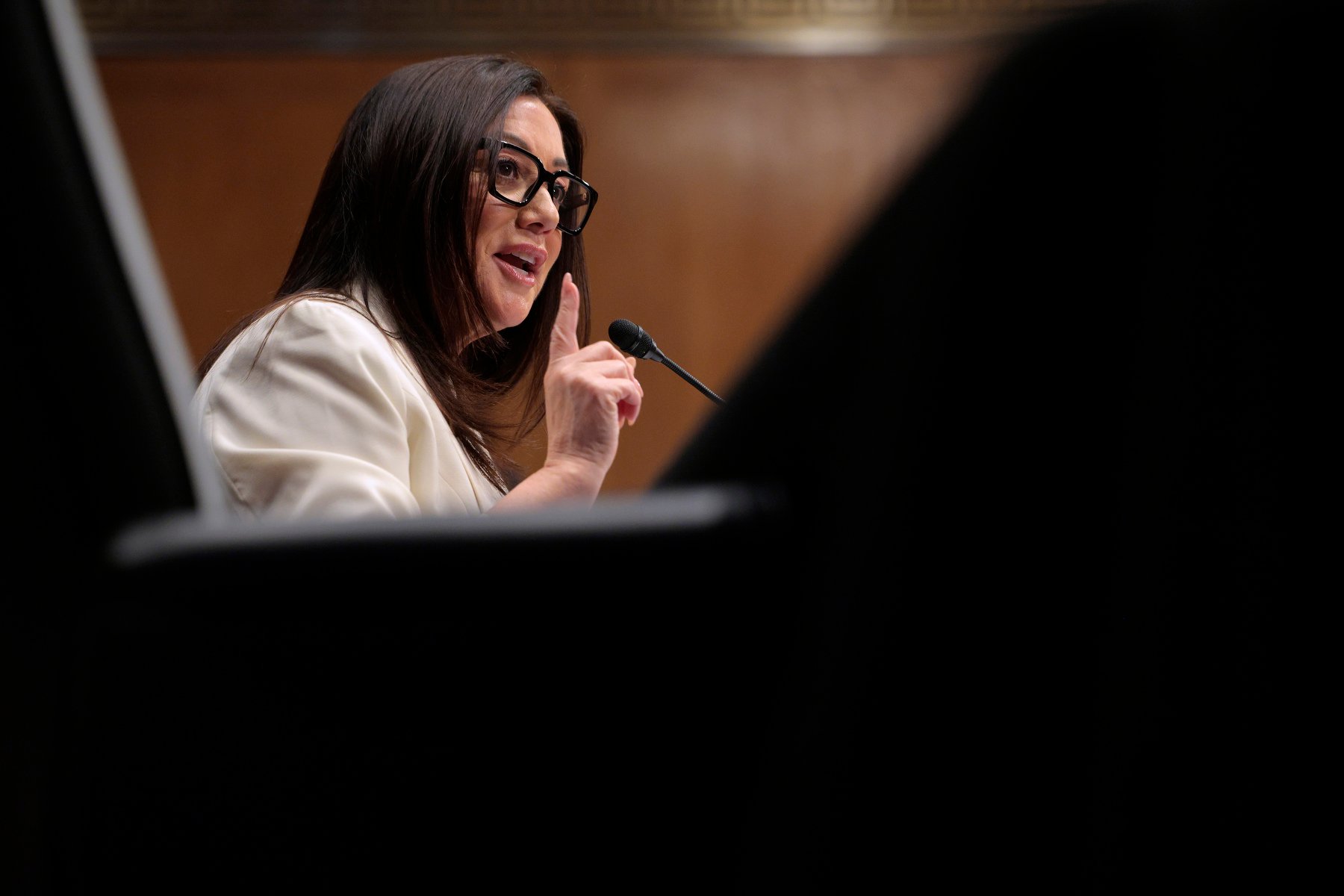Senators questioned Lori Chavez-DeRemer, President Donald Trump’s pick for labor secretary, for hours Wednesday on her support for unions, a national paid leave policy and child labor laws.
Chavez-DeRemer is one of eight women out of Trump’s 22 Cabinet nominees. While Democrats view her more favorably than most of his other picks, her nomination has been on somewhat shaky ground given her strong pro-labor tendencies.
In particular, committee members honed in on her previous support for the PRO Act, the Democrat-helmed bill that would have repealed state laws that allow workers to choose whether to opt into a union and pay dues, known as right-to-work laws, and expanded labor protections for employees’ rights to organize. Chavez-DeRemer co-sponsored the act during her single term in Congress representing an Oregon district. A version of the PRO Act has passed the House twice since 2019, while failing to reach the Senate floor both times.
“Your nomination has support from both unions and businesses. You’re in a unique position to build a bridge between these two groups to benefit all workers,” said Sen. Bill Cassidy, the Louisiana Republican who chairs the Health, Education, Labor and Pensions Committee. “There are concerns, however, about your past support for the Democrats’ cornerstone legislation.”
Sen. Rand Paul, a Republican from Kentucky, said repeatedly ahead of the hearing that he would be a staunch “no” on her nomination over her previous bill support. Other Republicans questioned her views on potentially removing right-to-work statutes that impact more than two dozen, mostly GOP-led states during the hearing.
Chavez-DeRemer said Wednesday that she realizes the bill was “imperfect.” Her support was directly tied to her work as a member of Congress who wanted to advocate for workers’ rights in the most feasible way possible, she said, and she pointed out that the House did not end up voting on the legislation last Congress.
“The PRO Act was the bill to have those conversations,” Chavez-DeRemer said in her opening remarks. “If confirmed, my job will be to implement President Trump’s policy vision, and my guiding principle will be President Trump’s guiding principle: ensuring a level playing field for businesses, unions, and, most importantly, the American worker.”
Should a version of the PRO Act be implemented, some advocates say, the national gender pay gap could be lowered and women could see more benefits like leave policies or time off. However, Republicans have critiqued the legislation, claiming it would allow unions to coerce or intimidate workers into joining and paying dues without an option to abstain from membership.
The Labor Department is in charge of setting workplace regulations and policies, including those on unemployment and retirement plans, as well as creating standards for wages and overtime.
Though the National Labor Relations Board (NLRB) and Equal Employment Opportunity Commission (EEOC) do not fall under the department’s purview, several Democrats grilled Chavez-DeRemer over Trump’s moves to weaken the bodies. The NLRB conducts union elections and investigates unfair labor practices, while the EEOC enforces federal laws prohibiting discrimination in the workplace.
Last month, Trump fired Democratic officials from the NLRB and EEOC, removing the necessary quorum to enforce decisions. On Tuesday, Trump signed an executive order that sought greater White House authority over independent regulatory agencies including the NLRB.
While Chavez-DeRemer recognized the necessity of an EEOC quorum, the Oregon Republican deferred on how she might speak about the commissions with the president, repeating that she has not yet been confirmed and said she is not fully briefed on the situation.
“I have not been read in with President Trump, but he has a right to exercise his executive power, and I do believe the NLRB has an important role independent of the Department of Labor,” she said. “I respect their position as an independent agency.”
Sens. Bernie Sanders, a Vermont Independent who caucuses with Democrats, and Andy Kim, a New Jersey Democrat, brought up the country’s lack of a guaranteed national paid leave standard. The United States is one of a handful of countries without one, and passage of a comprehensive policy outside of a tax credit that incentivizes paid leave seems less likely this year than previous cycles, according to experts.
When Kim pressed her for a specific position on paid leave, Chavez-DeRemer maintained that the issue was up to Congress and that she would enforce any legislation that becomes law.
“I cannot commit to you today that I would say 100 percent, paid leave, across the board, is something that should be taken up by the federal government,” she said. “I want people to have the opportunities to keep more of their hard-earned dollars. I know the president is in line with the America First agenda, to have those freedoms.”
Senators from both parties also questioned the nominee over child labor laws. Violations have increased over the last few years, with states including Arkansas recently weakening work protections for minors, while depleted DOL enforcement branches have struggled to keep up with investigations and consequences for employers.
Committee members asked Chavez-DeRemer, who has a small business background, about the approximately 27 million Americans who are self-employed or hold contract jobs. President Joe Biden’s administration issued a final rule that tightened the classifications for independent contractors under the Fair Labor and Standards Act, which conservative critics said decreased the number of people who have access to this flexibility.
Chavez-DeRemer said she would work with interested members of Congress on supporting those “key to the economy” contractors.



